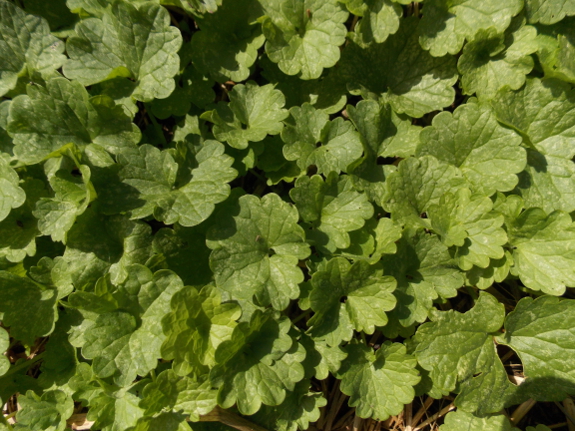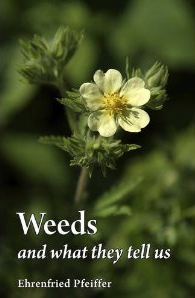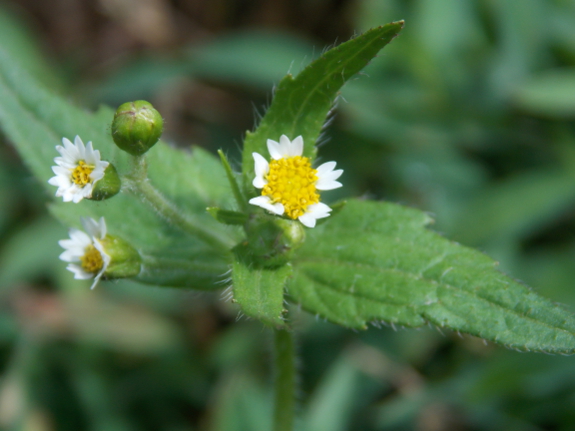
Two bad weeds (and what they tell me)

 The
hypothesis I often see put forth by the permaculture community is that
you can use weeds to discover imbalances in your soil. When I finally tracked down the best book on the subject, though, I was disappointed.
Since then, I've come to my own conclusions --- problematic weeds are
an indicator of issues with your management strategy, not necessarily of
problems with the ground underfoot.
The
hypothesis I often see put forth by the permaculture community is that
you can use weeds to discover imbalances in your soil. When I finally tracked down the best book on the subject, though, I was disappointed.
Since then, I've come to my own conclusions --- problematic weeds are
an indicator of issues with your management strategy, not necessarily of
problems with the ground underfoot.
Since I tweak my
gardening techniques every year, it's no surprise that our worst weeds
change with the times. This year's doozy is a plant that I used to
consider barely noticeable --- ground ivy (Glechoma hederacea),
which is pictured above. My mother enjoys this plant in her
garden for its bee-friendly spring flowers, its pleasant aroma, and the
way it quickly covers the ground. Unfortunately, ground ivy wreaks
havoc with the mulched areas since it quickly grows amid straw and
makes you lose most of your mulch when you rip it out.
Why is ground ivy
suddenly a big problem for us? I only see the weed in the shadier
parts of my garden, and primarily during wet years, making me think that
there's something about cool, wet conditions that gives ground ivy a
foothold over the grass that's supposed to be colonizing the garden aisles.
I can't do anything about the weather, but I can change a management
technique that I think has been giving the ground ivy a foothold in the
front garden aisles --- weedeating. Until this summer, Mark was in
charge of cutting our "lawn," and he generally opted to weedeat the
front garden rather than mow it since the aisles aren't very
linear. However, close cutting can promote ground ivy over grass,
especially in shady areas. Time to commit to mowing instead of
whacking the front garden grass!

When I first identified
our second troublesome weed of 2014, the book I looked it up in gave it
the appellation "devil's racehorse." I haven't been able to track
down the source of that name, and now call the weed by its more common
names (quickweed, shaggy soldier, Galinsoga quadriradiata).
But the colorful name that originally made me scratch my head makes so
much sense now that I garden --- quickweed will take over a garden
lickety split.
While ground ivy is the
bane of my existence in the shady front garden, quickweed makes its
annoying presence known in the sunny mule garden. I made the
mistake about three years ago of letting a single plant go to seed in a
garden bed there, and the result has been nearly endless handweeding of
every crop I've grown in that spot thereafter. The solution here
is pretty simple --- whatever you do, don't let quickweed go to seed in
your garden!
Have you learned from your garden weeds? If so, which ones taught you memorable lessons?
Want more in-depth information? Browse through our books.
Or explore more posts by date or by subject.
About us: Anna Hess and Mark Hamilton spent over a decade living self-sufficiently in the mountains of Virginia before moving north to start over from scratch in the foothills of Ohio. They've experimented with permaculture, no-till gardening, trailersteading, home-based microbusinesses and much more, writing about their adventures in both blogs and books.
Want to be notified when new comments are posted on this page? Click on the RSS button after you add a comment to subscribe to the comment feed, or simply check the box beside "email replies to me" while writing your comment.

Can you provide any particular book recommendations for identifying weeds? It seems so many books focus on wild edibles, food for X species, what general book would you recommend (or books?)
Thanks!
Hi Anna and Mark,
I have read several books and I agree with your conclusions.
Here, I sometimes see a "weed" take over everything only to fade later into nothingness.
A few years ago at the site of a former oak tree, black nightshade took over everything. A year later a few plants were left. Now nothing?
Some folks say it makes good pies. I was not that brave.
John